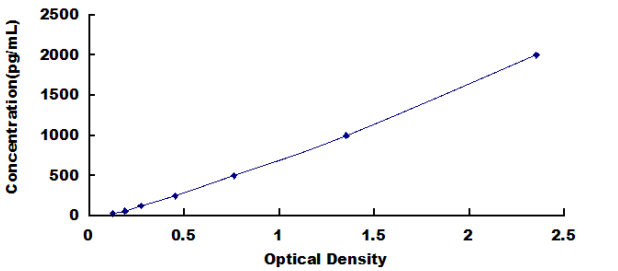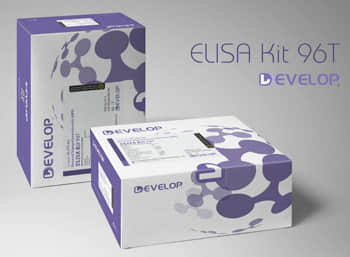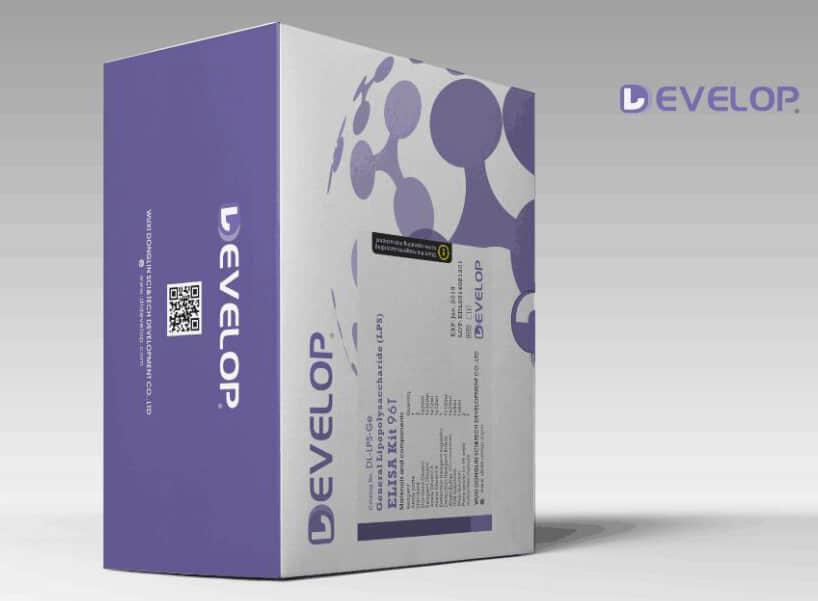Human Agrin (AGRN) ELISA Kit


two product lines: Traditional ELISA Kit and Ready-to-Use ELISA Kit.


Other names:Agrin Proteoglycan
Function: Component of the basal lamina that causes the aggregation of acetylcholine receptors and acetylcholine-esterase on the surface of muscle fibers of the neuromuscular junction.
Sequence:
10 20 30 40 50 MAGRSHPGPL RPLLPLLVVA ACVLPGAGGT CPERALERRE EEANVVLTGT 60 70 80 90 100 VEEILNVDPV QHTYSCKVRV WRYLKGKDLV ARESLLDGGN KVVISGFGDP 110 120 130 140 150 LICDNQVSTG DTRIFFVNPA PPYLWPAHKN ELMLNSSLMR ITLRNLEEVE 160 170 180 190 200 FCVEDKPGTH FTPVPPTPPD ACRGMLCGFG AVCEPNAEGP GRASCVCKKS 210 220 230 240 250 PCPSVVAPVC GSDASTYSNE CELQRAQCSQ QRRIRLLSRG PCGSRDPCSN 260 270 280 290 300 VTCSFGSTCA RSADGLTASC LCPATCRGAP EGTVCGSDGA DYPGECQLLR 310 320 330 340 350 RACARQENVF KKFDGPCDPC QGALPDPSRS CRVNPRTRRP EMLLRPESCP 360 370 380 390 400 ARQAPVCGDD GVTYENDCVM GRSGAARGLL LQKVRSGQCQ GRDQCPEPCR 410 420 430 440 450 FNAVCLSRRG RPRCSCDRVT CDGAYRPVCA QDGRTYDSDC WRQQAECRQQ 460 470 480 490 500 RAIPSKHQGP CDQAPSPCLG VQCAFGATCA VKNGQAACEC LQACSSLYDP 510 520 530 540 550 VCGSDGVTYG SACELEATAC TLGREIQVAR KGPCDRCGQC RFGALCEAET 560 570 580 590 600 GRCVCPSECV ALAQPVCGSD GHTYPSECML HVHACTHQIS LHVASAGPCE 610 620 630 640 650 TCGDAVCAFG AVCSAGQCVC PRCEHPPPGP VCGSDGVTYG SACELREAAC 660 670 680 690 700 LQQTQIEEAR AGPCEQAECG SGGSGSGEDG DCEQELCRQR GGIWDEDSED 710 720 730 740 750 GPCVCDFSCQ SVPGSPVCGS DGVTYSTECE LKKARCESQR GLYVAAQGAC 760 770 780 790 800 RGPTFAPLPP VAPLHCAQTP YGCCQDNITA ARGVGLAGCP SACQCNPHGS 810 820 830 840 850 YGGTCDPATG QCSCRPGVGG LRCDRCEPGF WNFRGIVTDG RSGCTPCSCD 860 870 880 890 900 PQGAVRDDCE QMTGLCSCKP GVAGPKCGQC PDGRALGPAG CEADASAPAT 910 920 930 940 950 CAEMRCEFGA RCVEESGSAH CVCPMLTCPE ANATKVCGSD GVTYGNECQL 960 970 980 990 1000 KTIACRQGLQ ISIQSLGPCQ EAVAPSTHPT SASVTVTTPG LLLSQALPAP 1010 1020 1030 1040 1050 PGALPLAPSS TAHSQTTPPP SSRPRTTASV PRTTVWPVLT VPPTAPSPAP 1060 1070 1080 1090 1100 SLVASAFGES GSTDGSSDEE LSGDQEASGG GSGGLEPLEG SSVATPGPPV 1110 1120 1130 1140 1150 ERASCYNSAL GCCSDGKTPS LDAEGSNCPA TKVFQGVLEL EGVEGQELFY 1160 1170 1180 1190 1200 TPEMADPKSE LFGETARSIE STLDDLFRNS DVKKDFRSVR LRDLGPGKSV 1210 1220 1230 1240 1250 RAIVDVHFDP TTAFRAPDVA RALLRQIQVS RRRSLGVRRP LQEHVRFMDF 1260 1270 1280 1290 1300 DWFPAFITGA TSGAIAAGAT ARATTASRLP SSAVTPRAPH PSHTSQPVAK 1310 1320 1330 1340 1350 TTAAPTTRRP PTTAPSRVPG RRPPAPQQPP KPCDSQPCFH GGTCQDWALG 1360 1370 1380 1390 1400 GGFTCSCPAG RGGAVCEKVL GAPVPAFEGR SFLAFPTLRA YHTLRLALEF 1410 1420 1430 1440 1450 RALEPQGLLL YNGNARGKDF LALALLDGRV QLRFDTGSGP AVLTSAVPVE 1460 1470 1480 1490 1500 PGQWHRLELS RHWRRGTLSV DGETPVLGES PSGTDGLNLD TDLFVGGVPE 1510 1520 1530 1540 1550 DQAAVALERT FVGAGLRGCI RLLDVNNQRL ELGIGPGAAT RGSGVGECGD 1560 1570 1580 1590 1600 HPCLPNPCHG GAPCQNLEAG RFHCQCPPGR VGPTCADEKS PCQPNPCHGA 1610 1620 1630 1640 1650 APCRVLPEGG AQCECPLGRE GTFCQTASGQ DGSGPFLADF NGFSHLELRG 1660 1670 1680 1690 1700 LHTFARDLGE KMALEVVFLA RGPSGLLLYN GQKTDGKGDF VSLALRDRRL 1710 1720 1730 1740 1750 EFRYDLGKGA AVIRSREPVT LGAWTRVSLE RNGRKGALRV GDGPRVLGES 1760 1770 1780 1790 1800 PKSRKVPHTV LNLKEPLYVG GAPDFSKLAR AAAVSSGFDG AIQLVSLGGR 1810 1820 1830 1840 1850 QLLTPEHVLR QVDVTSFAGH PCTRASGHPC LNGASCVPRE AAYVCLCPGG 1860 1870 1880 1890 1900 FSGPHCEKGL VEKSAGDVDT LAFDGRTFVE YLNAVTESEL ANEIPVPETL 1910 1920 1930 1940 1950 DSGALHSEKA LQSNHFELSL RTEATQGLVL WSGKATERAD YVALAIVDGH 1960 1970 1980 1990 2000 LQLSYNLGSQ PVVLRSTVPV NTNRWLRVVA HREQREGSLQ VGNEAPVTGS 2010 2020 2030 2040 2050 SPLGATQLDT DGALWLGGLP ELPVGPALPK AYGTGFVGCL RDVVVGRHPL 2060 HLLEDAVTKP ELRPCPTP
INTENDED USE
The kit is a sandwich enzyme immunoassay for the in vitro quantitative measurement of AGRN in human serum, plasma, tissue homogenates or other biological fluids.
DETECTION RANGE
31.25-2000pg/mL. The standard curve concentrations used for the ELISA’s were 2000pg/mL, 1000pg/mL, 500pg/mL, 250pg/mL, 125pg/mL, 62.5pg/mL, 31.2pg/mL.
SENSITIVITY
The minimum detectable dose of AGRN is typically less than 14.6pg/mL.
The sensitivity of this assay, or Lower Limit of Detection (LLD) was defined as the lowest protein concentration that could be differentiated from zero. It was determined by adding two standard deviations to the mean optical density value of twenty zero standard replicates and calculating the corresponding concentration.
SPECIFICITY
This assay has high sensitivity and excellent specificity for detection of AGRN.
No significant cross-reactivity or interference between AGRN and analogues was observed.
You can reference link of the kit as following
https://dldevelop.com/Research-reagent/dl-agrn-hu.html
https://www.dldevelop.com/uploadfile/data/DL-AGRN-Hu.pdf
Introduction
| Item | Standard | Test | |
| Description |
The kit is a sandwich enzyme immunoassay for the in vitro quantitative measurement of AGRN in human serum, plasma, tissue homogenates and other biological fluids. |
Conform | |
| Identification | Colorimetric | Positive | |
| Composition | Traditional ELISA Kit | Ready-to-Use ELISA KIT | Conform |
| Pre-coated, ready to use 96-well strip plate 1 | Pre-coated, ready to use 96-well strip plate 1 | ||
| Plate sealer for 96 wells 2 | Plate sealer for 96 wells 2 | ||
| Standard 2 | Standard 2 | ||
| Diluents buffer 1×45mL | Standard Diluent 1×20mL | ||
| Detection Reagent A 1×120μL | Detection Solution A 1×12mL | ||
| Detection Reagent B 1×120μL | Detection Solution B 1×12mL | ||
| TMB Substrate 1×9mL | TMB Substrate 1×9mL | ||
| Stop Solution 1×6mL | Stop Solution 1×6mL | ||
| Wash Buffer (30 × concentrate) 1×20mL | Wash Buffer (30 × concentrate) 1×20mL | ||
| Instruction manual 1 | Instruction manual 1 | ||
Test principle
The microtiter plate provided in this kit has been pre-coated with an antibody specific to the index. Standards or samples are then added to the appropriate microtiter plate wells with a biotin-conjugated antibody preparation specific to the index. Next, Avidin conjugated to Horseradish Peroxidase (HRP) is added to each microplate well and incubated. After TMB substrate solution is added, only those wells that contain the index, biotin-conjugated antibody and enzyme-conjugated Avidin will exhibit a change in color. The enzyme-substrate reaction is terminated by the addition of sulphuric acid solution and the color change is measured spectrophotometrically at a wavelength of 450nm ± 10nm. The concentration of the index in the samples is then determined by comparing the O.D. of the samples to the standard curve.
Recovery
Matrices listed below were spiked with certain level of recombinant AGRN and the recovery rates were calculated by comparing the measured value to the expected amount of the index in samples.
| Matrix | Recovery range (%) | Average(%) |
| serum(n=5) | 81-93 | 86 |
| EDTA plasma(n=5) | 80-97 | 88 |
| heparin plasma(n=5) | 90-101 | 95 |
Linearity
The linearity of the kit was assayed by testing samples spiked with appropriate concentration of the index and their serial dilutions. The results were demonstrated by the percentage of calculated concentration to the expected.
| Sample | 1:2 | 1:4 | 1:8 | 1:16 |
| serum(n=5) | 82-96% | 83-98% | 81-99% | 93-101% |
| EDTA plasma(n=5) | 88-101% | 86-95% | 90-102% | 80-93% |
| heparin plasma(n=5) | 80-91% | 82-90% | 95-104% | 79-95% |
Precision
Intra-assay Precision (Precision within an assay): 3 samples with low, middle and high level the index were tested 20 times on one plate, respectively.
Inter-assay Precision (Precision between assays): 3 samples with low, middle and high level the index were tested on 3 different plates, 8 replicates in each plate.
CV(%) = SD/meanX100
Intra-Assay: CV<10%
Inter-Assay: CV<12%
Stability
The stability of ELISA kit is determined by the loss rate of activity. The loss rate of this kit is less than 5% within the expiration date under appropriate storage conditions.
Note:
To minimize unnecessary influences on the performance, operation procedures and lab conditions, especially room temperature, air humidity and incubator temperatures should be strictly regulated. It is also strongly suggested that the whole assay is performed by the same experimenter from the beginning to the end.
Assay procedure summary
1. Prepare all reagents, samples and standards;
2. Add 100µL standard or sample to each well. Incubate 2 hours at 37℃;
3. Aspirate and add 100µL prepared Detection Reagent A. Incubate 1 hour at 37℃;
4. Aspirate and wash 3 times;
5. Add 100µL prepared Detection Reagent B. Incubate 1 hour at 37℃;
6. Aspirate and wash 5 times;
7. Add 90µL Substrate Solution. Incubate 15-25 minutes at 37℃;
8. Add 50µL Stop Solution. Read at 450nm immediately.
Order or get a Quote
We will reply you within 24 hours!














